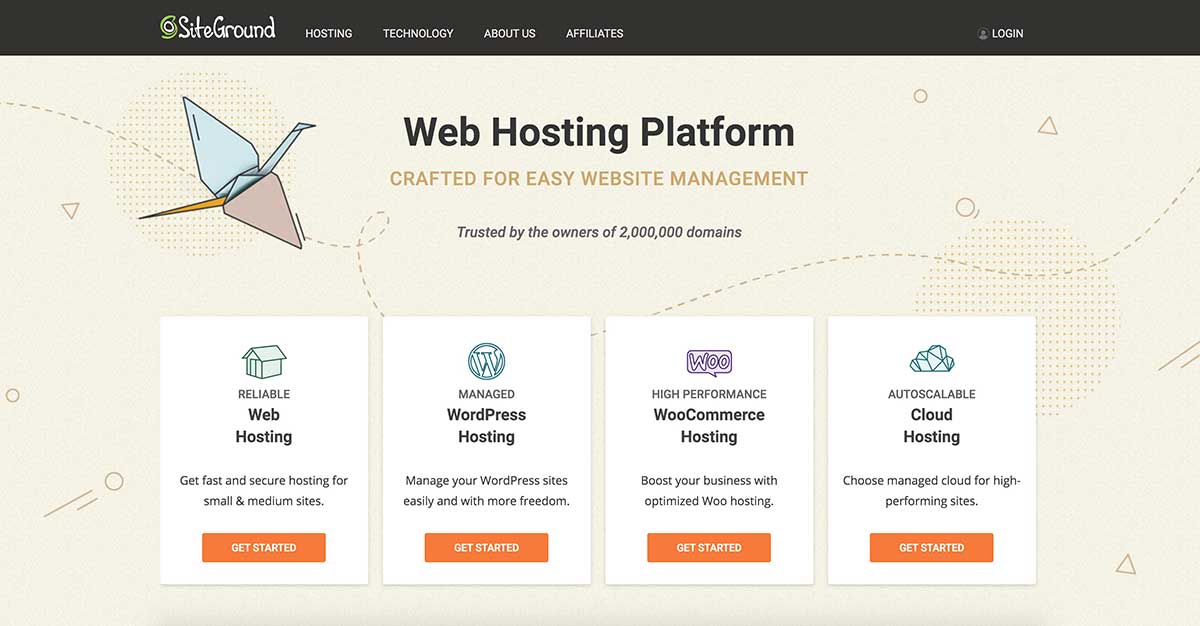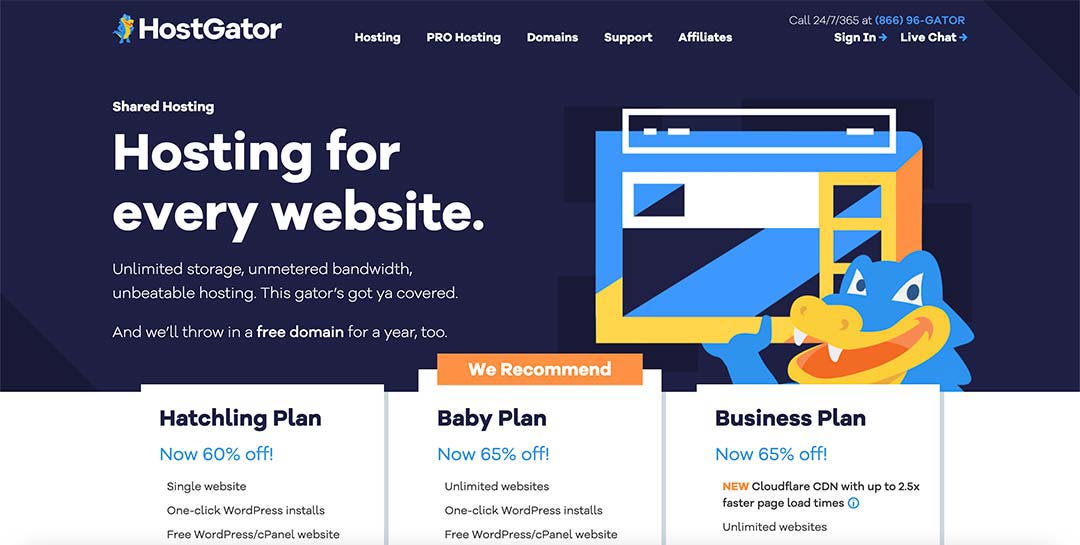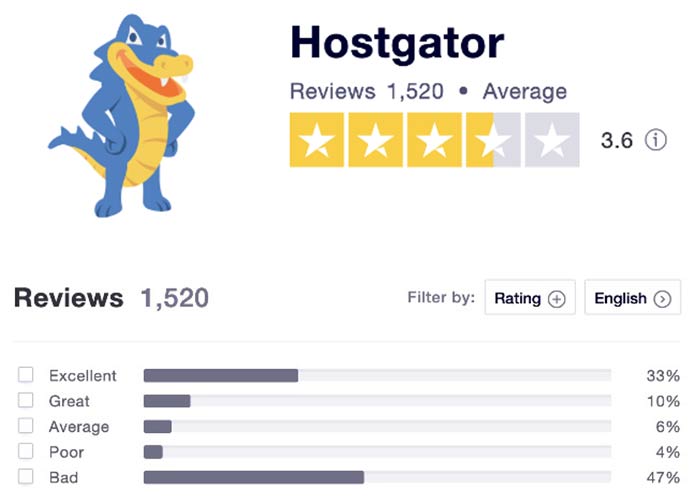
SiteGround and Hostgator are among the top choices of web hosting providers on the market.
While SiteGround is recommended as a top choice for WordPress hosting, Hostgator is known for its affordable pricing.
Both hosting providers have surely earned their place among the world’s best. We’ve tried both of them and we’re here to share our experience.
As digital experts who have tried both services, we’re here to share our insights.
In our head-to-head analysis, we compare SiteGround and HostGator on over 16 features and performance tests, ultimately crowning a winner in this fierce battle.
Our comparison spans essential categories, such as speed, uptime, security, server performance, and customer service, to help you make an informed decision about which provider best meets your needs. So, let’s dive into the detailed evaluation of SiteGround and HostGator.
Introducing SiteGround

SiteGround was founded in 2004 in Bulgaria, and it wasn’t long before this hosting company started making waves in the hosting space.
Not only does SiteGround host over 2 million websites, but it also operates with over 500 full-time team members. SiteGround stands apart from other hosting providers due to its commitment to delivering quality at every level.
It’s no surprise why WordPress.org recommends SiteGround as one of the best web hosting companies on today’s market.
Add to this mix SiteGround’s steadfast dedication to crafting state-of-the-art technology and customer support that clients rave about. All in all, contender number one is a tough one to beat.
Introducing Hostgator

Founded in 2002, Hostgator made a name for itself as a leader in the hosting market due to its low-cost, beginner-friendly hosting options.
It has hosted over 2.5 million websites and operates with 1,000+ full-time team members.
So it’s no surprise why Hostgator was acquired in 2012 by the Endurance International Group (EIG) for $299.8 million! EIG now owns a solid portfolio of hosting companies and means serious business.
Hostgator vs SiteGround: Web Hosting Plans Compared

Let’s start the analysis by comparing the plans you can access from each company.
| Hostgator | SiteGround | |
|---|---|---|
| Cheap Shared Hosting | ||
| Managed WP Hosting | ||
| Managed Woocommerce Hosting | ||
| Cloud Hosting | Kind of... | |
| VPS | ||
| Dedicated Server Hosting |
Most notably, SiteGround does not offer VPS And, Hostgator does not offer Woocommerce or true cloud-based hosting. As you can see, both web hosts offer cheap shared hosting and WordPress hosting. Other than these two, the remaining plans differ quite significantly.
If you’re building an e-commerce store using Woocommerce and you’re after managed hosting, SiteGround is the better choice for your needs. For everyone else, it’s not going to be so simple.
It’s also worth noting that moving websites to the cloud is a smart move by SiteGround. By leveraging dedicated cloud technology, SiteGround can offer the power of Google’s Cloud Platform directly to their customers.
The benefits include scalability, better uptime rates, and more secure services. Hostgator also promotes cloud-based hosting, but it’s not comparable to what SiteGround offers. You’ll learn more about this later in this article.
You’ll also find out the differences between the shared plans in more detail as it can be hard to know which is best at face value.
When looking at SiteGround vs Hostgator pricing, first impressions can lead you astray.
Both web hosts offer discounted pricing for new plans. The condition a customer must satisfy to secure these low rates is to sign up for a long-term plan.
Promotional Pricing
| Plan | Hostgator Shared Hosting | SiteGround Shared Hosting |
|---|---|---|
| Lowest Tier | $2.75/month | $5.99/month |
| Middle Tier | $3.50/month | $8.99/month |
| Highest Tier | $5.25/month | $14.99/month |
If price is your biggest concern, Hostgator’s promotional pricing works out significantly cheaper. Add to it the fact that Hostgator adds further discounts during events like Black Friday and you can score even lower rates than the above!
With SiteGround, you only need to sign up for a 12-month term, but with Hostgator, you need to sign up for 36 months to secure the cheapest rates.
Renewal Pricing
| Plan | Hostgator Shared Hosting | SiteGround Shared Hosting |
|---|---|---|
| Lowest Tier | $6.95 - $10.95/month | $19.99/month |
| Middle Tier | $9.95 - $11.95/month | $29.99/month |
| Highest Tier | $14.95 - $16.95/month | $49.99/month |
It’s worth noting, however, the level of quality is significantly different between the two. We’ll get to these differences further down…
Winner: Hostgator is a clear winner on shared hosting if the price is a concern for you. It comes in at up to 70% cheaper than the price that SiteGround charges.
2. Managed WordPress Website Hosting
SiteGround is a great hosting provider for many WordPress users. It is recommended by WordPress.org [1], alongside DreamHost and Bluehost.
In saying this, Hostgator also offers WordPress site hosting.
As mentioned above, both SiteGround and Hostgator offer shared WP hosting and managed WP hosting. Hostgator does not offer Woocommerce hosting, so it may not be the best option for e-commerce stores on WordPress.
Promotional Pricing
| Plan | Hostgator WordPress Hosting | SiteGround WordPress Hosting |
|---|---|---|
| Shared WP | From $2.75/month | From $5.99/month |
| Managed WP | From $5.95/month | From $5.99/month |
| Managed Woocommerce | N/A | From $5.99/month |
Renewal Pricing
| Plan | Hostgator WordPress Hosting | SiteGround WordPress Hosting |
|---|---|---|
| Shared WP | From $6.95/month | From $19.99/month |
| Managed WP | From $14.95/month | From $19.99/month |
| Managed Woocommerce | N/A | From $5.99/month |
Winner: Once again, Hostgator comes out on top with regard to pricing for shared and managed WordPress hosting.
3. VPS, Dedicated & Cloud Web Hosting Plans
When comparing dedicated and Virtual Private Server hosting to cloud-based hosting, we have to note that we’re not comparing apples to apples here.
Cloud hosting exists across multiple servers and uses virtualized partitions to offer dedicated resources. If one particular server is experiencing issues, your site won’t go down with it!
VPS hosting is like a cross between dedicated and shared hosting. It is a virtually partitioned space on a single shared server. You get all the resources in this space to yourself, but you’re still sharing the server with other websites.
Dedicated hosting gives you access to your own physical server. It is best for websites that get a lot of traffic every month and need more resources.
It’s also important to note that Hostgator’s cloud plans are not comparable to those offered by Siteground. Despite using the same terminology, they’re more like shared hosting on steroids.
The biggest drawbacks about Hostgator’s cloud-based plans are that:
They don’t offer root access
They’re cheap because they use cloud SSD shared hosting
They don’t offer a virtualized VPS
They cap the resources you can access
They don’t offer a dedicated server environment
In other words, Hostgator’s cloud-based plans are not true hosting. For this reason, we didn’t include these plans in the comparisons below.
We’d only suggest using Hostgator’s cloud-based plans if you want to move your website to the cloud on a very low budget. Even so, the only tangible benefit you’ll get is faster loading speeds.
Promotional Pricing
| Plan | SiteGround: Cloud Hosting | Hostgator: Dedicated Hosting | Hostgator: VPS Hosting |
|---|---|---|---|
| Lowest Tier | $100/month | $89.98/month | $19.95/month |
| Middle Tier | $200-$300/month | $119.98/month | $29.95/month |
| Highest tier | $400/month | $139.99/month | $39.95/month |
Renewal Pricing
| Plan | SiteGround: Cloud Hosting | Hostgator: Dedicated Hosting | Hostgator: VPS Hosting |
|---|---|---|---|
| Lowest Tier | $100/month | $189/month | $79.95/month |
| Middle Tier | $200-$300/month | $249/month | $119.95/month |
| Highest tier | $400/month | $289/month | $149.95/month |
Overall, Hostgator’s VPS has lower CPU core power and less storage but is also the most affordable of these three options.
It’s worth noting that SiteGround doesn’t offer promotional pricing on their cloud hosting. Despite coming in slightly more expensive initially, SiteGround offers more features and security since they leverage Google’s Cloud Platform.
Hostgator’s dedicated hosting services are a closer match to SiteGround’s cloud-based solutions when it comes to the resources allocated.
SiteGround’s cloud storage options typically have more CPU cores. But, the SSD storage and RAM can be lower than the nearest comparable Hostgator dedicated plan.
Winner: It’s a close call despite the differences in the server setup of each of these types of hosting. We’re handing it to SiteGround for this round.
Not only does SiteGround leverage the Google Cloud Platform, but the renewal prices also come in lower than the costs of Hostgator’s dedicated servers.
SiteGround also offers servers with greater CPU power despite having less storage and RAM on some occasions.
Hosting Features Comparison
When shopping for a reliable hosting company, you need to go beyond price to find the best-performing company for your needs.
That’s why we have shared the data from the tests we’ve run comparing SiteGround and Hostgator in all the top hosting features.
1. Ease of Use
Both Hostgator and SiteGround offer easy-to-use, intuitive dashboards and good hosting services. SiteGround’s team has developed a custom dashboard that is far simpler than the typical cPanel style hosting account.

Hostgator, on the other hand, uses the classic cPanel based solutions for most of their hosting accounts.
Winner: Both are intuitive and easy to use. However, we’re handing it to SiteGround due to the wide range of 1-click install options (including a 1-click WordPress installation option too).
2. Speed
It’s no surprise that Google has made website loading speed a ranking factor. Not only is it crucial for user experience, but there are direct implications between slow loading times and the profits earned.
In 2006, Amazon’s engineers discovered that for every 100ms in latency, there was a reduction in profits earned by 1%. Sure it may not sound like much but by today’s standards, 1% of Amazon’s revenue is around $3.8 billion!
Poor hosting services could also be costing you a tonne of hard-earned cash.
So we put SiteGround and Hostgator to the test to see who puts their money where their mouth is.
GT Metrix
Hostgator | SiteGround | |||
|---|---|---|---|---|
| Performance Score | TTFB | Performance Score | TTFB | |
| Vancouver | 48% | 1.6s | 93% | 108ms |
| London | 27% | 1.7s | 72% | 936ms |
| Sydney | 12% | 1.3s | 72% | 1.3s269ms |
Pingdom
Hostgator | SiteGround | |||
|---|---|---|---|---|
| Pingdom Performance | Pingdom Load Time | Pingdom Performance | Pingdom Load Time | |
| San Francisco | 65 | 3.24s | 96 | 508ms |
| Frankfurt | 65 | 2.84s | 96 | 726ms |
| Tokyo | 65 | 3.09s | 96 | 792ms |
| London | 64 | 5.70s | 95 | 1.79s |
| Washington DC | 64 | 3.65s | 86 | 720ms |
| Sydney | 64 | 3.41s | 96 | 1.21s |
Winner: The data doesn’t lie! Hands down, this one goes to SiteGround.
If you’re curious to see how SiteGround compares to other hosting companies, check out our post on the fastest web hosting companies.
3. Uptime
Uptime is another critical hosting feature that a reliable hosting company shouldn’t dismiss. Any decent hosting company should prioritize uptime as a core feature of their service.
In saying that, no host can guarantee 100% uptime. SiteGround guarantees 99.98% whereas Hostgator only guarantees 99.90%.
Let’s take a look at whether they live up to these guarantees.
Hostgator Uptime
At one point, Hostgator did have the highest uptime guarantee at 99.99%.
But, it seems that instead of ensuring their servers were able to meet this guarantee, they chose to lower the guaranteed amount quite significantly.
At the current amount of 99.90%, this allows Hostgator’s servers to experience up to 8 hours and 45 minutes of downtime per year instead of just 52 minutes – per the original guarantee.
What’s more, Hostgator’s uptime performance in recent years has been below optimal. According to Pingdom’s uptime monitoring data[2], Hostgator’s average uptime is 99.89% since 2015.
SiteGround Uptime
SiteGround’s guarantee has been 99.98% and according to our uptime monitoring data, they’re been upholding it consistently since 2017.
SiteGround’s average uptime since July 2017 has been 99.99%.
In 2021, Pingdom’s uptime data[3] reported only 2 months that were below 100% uptime. February 2021 was at 99.99% and October was at 99.97%.
All in all, we’re impressed!
Here’s the data in a head-to-head format.
2018 Uptime | 2019 Uptime | 2020 Uptime | 2021 Uptime | |
|---|---|---|---|---|
| Hostgator | 99.98% | 99.94% | 99.91% | 99.98% |
| SiteGround | 99.99% | 99.98% | 99.99% | 100% |
Not only does SiteGround maintain its guarantee across a yearly average, but their team is also proactive about improving their server performance.
Check out what we discovered in our in-depth SiteGround review.
Winner: We’re handing it to SiteGround. Solid uptime is a critical feature you should be looking for in your hosting provider if you care about your site’s performance.
This is in stark contrast to Hostgator who chose to lower their guaranteed uptime amount instead of improving their server infrastructure.
4. Customer Support
There is no doubt that a time will come when you need to reach out to your hosting company’s customer support team. It doesn’t matter how skilled you are with building websites, hosting problems happen to the best of us.
In our book, superior customer support is what differentiates a good web hosting company from an excellent one.
To compare the level of customer support between these two hosting providers, we turned to Trustpilot. You can access Hostgator’s page here and SiteGround’s one here.
SiteGround Support

SiteGround customer support rating on Trustpilot
Hostgator Support

Hostgator customer support rating on Trustpilot
Winner: Winner winner chicken dinner! SiteGround is no doubt the winner when it comes to customer support. With over 9,000 reviews and an average score of “Excellent”, we’re impressed.
And, as a sweet cherry on top, we love that SiteGround proactively overstaffs every shift, so no customer is left hanging.
What more can you ask for?
5. Server Location
Does your website target audiences in a specific location?
It’s worth exploring the ideal server location for your website and ensuring your hosting company has appropriate web hosting services for you.
Hostgator’s data centers are located in Utah and Texas. You also cannot choose which data center your files are stored at.
On the other hand, SiteGround offers more flexibility due to the 6 locations of their data centers around the world.
They currently have servers located in:
 Iowa, USA
Iowa, USA London, UK
London, UK Eemshaven, Netherlands
Eemshaven, Netherlands Frankfurt, DE
Frankfurt, DE Sydney, AU
Sydney, AU Singapore, Singapore
Singapore, Singapore

SiteGround data centers around the world.
Winner: SiteGround due to the wide range of server locations available. It is also possible for you to specify which servers you prefer to use.
6. Storage
For the shared plans, both Hostgator and SiteGround offer unmetered options.
Of the two, SiteGround does cap the amount of web space GB available but offers unlimited databases and unmetered traffic.
Hostgator offers unmetered bandwidth on all plans and does not state any storage limits though a fair use policy applies.
When it comes to the pro hosting packages, SiteGround’s cloud options are most similar to Hostgator’s dedicated plans.
SiteGround’s plans offer more CPU core power. However, Hostgator’s options aren’t too shabby either. Where Hostgator shines is in the amount of SSD storage offered. It often surpasses SiteGround’s options and can be cheaper.
In saying this, the storage space alone isn’t a strong enough reason to choose a Hostgator dedicated plan over SiteGround’s cloud servers. Cloud servers offer so much more in the way of security and backups. We’ll get to that next.
Winner: We’re calling this one a tie. If we were forced to pick a winner, we’re leaning (ever so slightly) towards Hostgator due to the higher amounts of SSD storage available.
7. Security
Every web hosting company offers some promise along the lines of “we offer the best security features” on their website.
To know who really offers the best security, you have to dig much deeper than the surface. Here’s what we found once we dug beyond the hyped-up sales copy.
| SiteGround | Hostgator | |
|---|---|---|
| Free SSL Certificate | Yes (Let’s Encrypt, pre-installed) | Yes (Let’s Encrypt) |
| Hotlink Protection | Yes | Yes |
| Spam Protection | Yes | Paid Option - Spam Assassin |
| Free Automatic Backups | Yes (Daily) | Yes (Weekly) |
| Web Application Firewall | Yes | Yes |
| DDoS Protection | Yes | Yes |
| Brute Force Protection | Yes | Yes |
| Bot Blocking | Yes | Yes - Manual |
| Malware Protection | Yes | Paid Option |
| 24/7 Server Monitoring | Yes | Yes |
| WP Security Plugin | Yes (Free) | No |
To achieve the same level of security with Hostgator, you’ll need to invest in upsell offers and additional plugins to do the job. When you factor in all these extra costs, Hostgator loses its price point advantage over SiteGround.
Winner: SiteGround. All of the desired security features mentioned above are included for free in all of SiteGround’s plans.
8. Backups
Website backups are a critical feature. If anything ever goes wrong, you’ll want to know that you can rely on your data to be backed up.
Hostgator makes it very clear that they take no responsibility for failed backups. They do offer free weekly backups for customers, but they’re also “not guaranteed in any way”[4].
Besides, they only take backups once a week on a random day.
On the other hand, SiteGround offers free automated daily backups on every plan (which you can restore for free anytime). Their approach is also much more proactive by offering geographically distributed redundant and mirrored backups too.
This means if a data center in a particular area went down, your website won’t go down with it.
Winner: SiteGround due to including free daily backups on all plans and taking a more proactive approach than Hostgator.
9. Domains
Hostgator offers free domains on some plans whereas SiteGround doesn’t offer free domain names at all.
In saying this, Hostgator’s domains renew from $18 per year after the initial free period. This is higher than the average cost of domain renewal across the market.
We recommend looking at cheaper places to buy domains if you want to minimize long term costs of your domain name.
Winner: Hostgator since they still offer a free domain on some plans.
10. Migrations
Thinking of switching to a new web host?
Both Hostgator and SiteGround have free website migration options available. SiteGround has a free migration plugin whereas Hostgator has a free professional service.
Depending on the number of websites you have, both companies also offer paid options to help make the switch as seamless as possible.
| SiteGround | Hostgator | |
|---|---|---|
| Price | $30 | Free |
| Number of Sites | Per site | Depends on your plan |
| Emails | No | Manual |
| Availability | All accounts | Available on all accounts with restrictions |
Winner: We’re leaning towards Hostgator for this one. Being able to offer free professional migrations for beginners is a great incentive!
Pros & Cons
Low prices
Beginner-friendly
Free website migrations
Free SSL certificate
Uptime could be improved
Poor customer support
Poor speed performance
Poor website performance
Limited server locations
Advanced hosting features
Free SSL certificates & security
30-Day money-back guarantee
100% renewable energy match
Multiple server locations
Excellent customer support
Recommended WP hosting service
Doesn’t offer unlimited storage
Doesn’t include a free domain name
Doesn’t offer free migration services
SiteGround vs Hostgator: The Ultimate Winner
If you have a WordPress website and are choosing between these two popular web hosting companies, our top pick is SiteGround.
Sure Hostgator seems to offer cheaper prices out of the box. But, by the time you factor in the additional costs that Hostgator’s service needs to provide equal security and performance, the price difference is negligible at best.
Add to it SiteGround’s proactiveness in all the areas that matter, and you’ve got a winning service right there!
As supported by the data shared in our SiteGround vs Hostgator review, there’s no question why SiteGround is the better option between the two.
Our #1 Recommendation: Siteground

Load Time
Uptime
Support Score
Pricing
